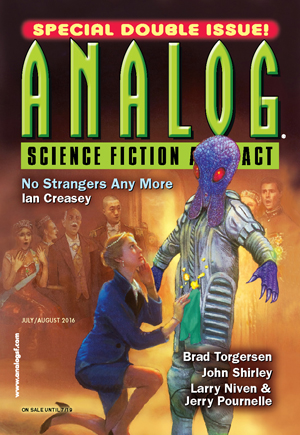
|
One of a princess's many duties is to make polite conversation and avoid controversial subjects. Screw that, thought Rose. At the banquet after the first day of the conference, there was only one topic on everyone's mind, so she raised it. "Are these aliens really going to buy the Moon?" |
This story arose from a phone conversation with a friend who was born in 1966. I can't remember the context, but for some reason he mentioned that if he lived to be a hundred, then not only would he get a birthday card from the King, but the monarchy itself would then be a thousand years old — if counting from the Norman Conquest in 1066. (Any starting point is somewhat arbitrary, but my friend and I grew up during an era when school history lessons emphasised the Norman Conquest.)
I became intrigued by the notion of the monarchy's thousandth anniversary, and I started making notes for a story set in the year 2066. At the time I was recovering from ill health, and concentrating on writing was one way to take my mind off things. Not long after that phone call, I went on my first hike since I'd been ill, and I spent the walk mulling over scenarios in my head. Just past a farmhouse near Keighley Moor Reservoir, I sat down to write in my notebook. A man emerged from the house and asked if I would mind moving on. He said he was racing his pigeons: they were due back any time, but if I was sitting there, I could spook them and they wouldn't return. I'd heard about pigeon-racing, but this was the first time I'd encountered it. For the sake of the pigeons, I moved on. Further up the valley, I sat down and made my notes. I looked back toward the farmhouse, but didn't see any returning pigeons. Perhaps I'd scared them off; or perhaps the guy had concocted the world's weirdest excuse for getting rid of people who dared to sit down near his property.
I decided that my protagonist would be a princess in the mould of Diana, and that she would meet an alien diplomat. The original Diana died tragically, but I wanted to write an upbeat story with a comic tone. Hence my inspiration focused on Diana's personality rather than her past; I invented my own plot rather than retelling historical events.
A major aspect of the story is the media landscape. Diana attracted a huge amount of press coverage, and that was in an era when newspapers only came out once a day. In a futuristic milieu extrapolated from today's 24/7 online culture, media attention would be omnipresent. I therefore included lots of interstitial snippets from various media outlets. Some of these were infodumps to serve the narrative; others were humour and satire.
Since the entire story was inspired by my friend's comment about living to be a hundred in the year 2066, I included a cameo role for him as a centenarian who meets the princess. He kindly gave his permission for this, and didn't object even when he saw the fruity dialogue I'd assigned to him.
I wrote the first draft of the story in 2012, when the imagined future was just over fifty years away. One piece of worldbuilding was a referendum on whether to abolish the monarchy and convert Britain into a republic. Another was this:
|
After leaving the European Union, Britain had become an irrelevance in world politics. This made the UK an ideal venue for international conferences: neutral and insignificant, but with plenty of pageantry. |
For most of my lifetime, Britain's relationship with Europe has been a festering issue, so it wasn't much of a stretch to suppose that Britain might leave the EU. Nevertheless, it was an interesting coincidence that the story's publication coincided with a referendum, held on 23 June 2016, when the nation voted on EU membership and decided to exit.
Publication was delayed until 2016 because selling this story wasn't straightforward. I sent it to one market and received an acceptance, followed several months later by an apologetic message retracting the acceptance. These things happen occasionally, but I was particularly annoyed that it had happened with this piece, because longer stories are always harder to sell, so I was worried that I might not be able to place it elsewhere. However, the next market I tried was Analog, and they published it. Analog wasn't my first choice for this story because I honestly didn't think it was quite their kind of thing. But not only did it sell to Analog, it became the issue's lead story and cover illustration. This just goes to show that writers shouldn't self-reject. Let the editor decide whether a story is their kind of thing!
